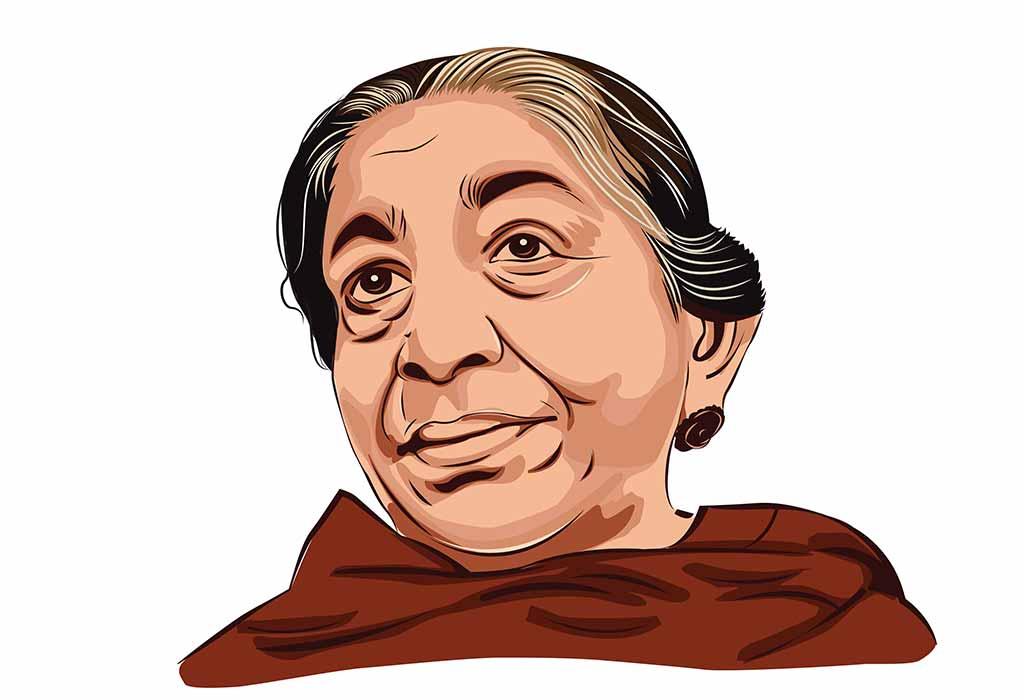Sarojini Naidu is also known as ‘Bharat Kokila’ or the ‘Nightingale of India’. She was a prominent face of Indian politics and a great poet. She became famous as she played an essential role in women’s empowerment in India. There is so much to know about this eminent lady, which we will learn by writing an essay about her. Essay writing is an essential skill that helps your child build a strong vocabulary. The child learns to create a flow between sentences, boosting their creativity and imagination. So, let’s write three different styles of essays on Sarojini Naidu for classes 1, 2 and 3.
Key Points To Remember When Writing Essay On Sarojini Naidu
There is no hard and fast content flow or syntax for essay writing. And that makes it the simplest form of writing in the English curriculum. Let us see some key points to writing an essay on Sarojini Naidu in English:
Bạn đang xem: Essay On Sarojini Naidu for Children and Students
- Write a good introduction for the topic given. It will be your stepping stone to an engaging essay.
- Now write sentences that support the topic and maintain a flow.
- Don’t write random sentences that do not go with the flow.
- Decide on the number of paragraphs and distribute the content accordingly.
- Continue to build the idea in the paragraphs to follow.
- Good paragraph breaks keep the reader’s interest intact.
- A systematic plan will always help you to write outstandingly.
10 Lines On Sarojini Naidu
Teaching essay writing is usually systematic. In initial primary classes, the essays for classes 1 and 2 would be putting down 10-12 lines on a topic. Here are a few lines on Sarojini Naidu that highlight the most important aspects of her life:
- Sarojini Naidu was a great Indian poet, an idol for everyone, a freedom fighter, and a political activist.
- This eminent woman was born in a Bengali family in Hyderabad on February 13 1879.
- Her family had great artists and were well-known in Hyderabad.
- She was an ardent follower of Mahatma Gandhi.
- Mahatma Gandhi called her ‘the Nightingale of India’ or ‘Bharat Kokila. It is because of her poetry’s colour, lyrical quality, and imagery that awakened the country.
- After the partition of Bengal in 1905, Sarojini Naidu made a firm decision to follow the nationalist movement. Under the guidance of Mahatma Gandhi, she took part in the Salt Satyagraha in 1930.
- She also led the Quit India Movement and Civil Disobedience Movement.
- She was a great speaker and presented her lectures to the entire nation.
- She became the first lady president of the Indian National Congress in 1925.
- Sarojini Naidu also became the first woman governor of the United Provinces.
Paragraph on Sarojini Naidu
This Sarojini Naidu essay explores her inspiring journey, showcasing how her words and actions continue to resonate in contemporary society. Here’s an example of an essay on Sarojini Naidu in just a paragraph:
Sarojini Naidu was a wonderful woman born on February 13, 1879, in Hyderabad, India. She is called the “Nightingale of India” because she wrote beautiful poems. Sarojini was very clever and started writing poems when she was twelve. She studied in England and then returned to India, where she helped India become free from British rule. Sarojini worked hard for women’s rights, too. 1925, she became the first woman to lead the Indian National Congress. Sarojini Naidu is remembered as a great poet and a brave leader who inspired many people in India.
Short Essay On Sarojini Naidu
Sarojini Naidu, often hailed as the ‘Nightingale of India’, was a remarkable poet and a genuine freedom fighter whose literary prowess and political activism left an indelible mark on Indian history. Here’s an example of a short essay on her:
Sarojini Naidu was born in February 1879 in Hyderabad, a state of British India. Her father, Mr Aghorenath Chattopadhyay, was an educationist and social reformer, and he founded Nizam college of Hyderabad. Mrs Barada Sundari Devi, her mother, was a Bengali poet. Sarojini Naidu followed her parent’s legacy, had a bright career, and began writing at 12. Her plays and poems impressed the Nizam of Hyderabad.
She was sent to England for education at 16, and she met Dr Govind Naidu there and married him after completing her education in 1989. Later she became a renowned poet and did impeccable work for women in India; and was also a part of important movements in the freedom struggle. She is popularly and lovingly known as ‘the Nightingale of India’. In 1947, she was chosen as the governor of the United Provinces. Sarojini Naidu died on March 2, 1949, due to cardiac arrest.
Long Essay On Sarojini Naidu
Xem thêm : भारत में बीघा क्या होता है? जानें इस बारे में सबकुछ
If you teach your children essay writing this way, they will love this way of learning as a progression. This part will teach your child to build the flow efficiently by putting everything under a sub-head. The below sample can be a good essay for class 3.
Who Is Sarojini Naidu And Why She Is Called Nightingale Of India?
Sarojini Naidu was a renowned poet and an Indian political activist. She was an important face in India’s struggle for independence and Salt Satyagraha and led movements like Quit India and Civil Disobedience Movement. She always fought for civil rights and women’s rights. Her excellent work in poetry gained her the nickname ‘Bharat Kokila’ or ‘the Nightingale of India. Mahatma Gandhi gave her this name due to the lyrical quality, imagery and colour of her poetry.
Early Life And Education Of Sarojini Naidu
Sarojini Naidu was born to Mr Aghorenath Chattopadhyay and Varada Sundari Dev on February 13 1879, in Hyderabad. Her father founded the Nizam College and earned a doctorate from Edinburgh University; her mother was a Bengali poet. She had eight siblings, and Sarojini was the eldest. The entire family was full of artists and was a well-known family in Hyderabad.
Born to a very well-educated family, Sarojini was excellent in academics. In 1891, she earned the highest rank in the matriculation examination and went to study in England with a scholarship from 1895 to 1898. After returning to Hyderabad in 1898, she married a physician called Dr Govindarajulu Naidu.
Sarojini Naidu’s Contribution
Sarojini Naidu has made major contributions in three fields: women empowerment, poetry, and India’s independence struggle.
Political Contributions:
- Post Bengal’s partition in 1905, Sarojini Naidu became a part of India’s freedom struggle.
- Under the guidance of Mahatma Gandhi, she participated in the Salt Satyagraha in 1930.
- She led movements like Quit India Movement and Civil Disobedience Movement.
- She got arrested many times but continued her support for the freedom struggle.
- After India’s freedom, she was appointed the first female governor of the United Provinces.
Women Empowerment:
- She was a public speaker and always talked about women’s rights, specifically women’s education.
- Along with Annie Besant, she founded the Women’s Indian Association in 1917.
Poetry:
- At the tender age of 12, Sarojini Naidu started writing. Nizams and British rulers at that time loved her work.
Legacies Of Sarojini Naidu
Sarojini Naidu died due to a heart attack on March 2, 1949. She was one of the greatest poets of her time. Her daughter Padmaja Naidu also wrote many poems. She released a collection of poetry called ‘The Feather of the Dawn’ in 1961, which Sarojini Naidu wrote in 1927. Another famous piece of poetry by her was ‘The Gift of India’. It showcased the patriotism and the political climate in India in 1915.
Interesting Facts About Sarojini Naidu For Children
Xem thêm : जीके के 25 सवाल 2024, download PDF
Below are some interesting facts about Sarojini Naidu that you should know:
- She started her career in literature at the age of 12 and wrote a play called Maher Muneer at that age. She went to London for her higher studies at the age of 16.
- Her political journey started in 1904, joining the Indian National Movement. She delivered lectures on women’s empowerment, social welfare, and nationalism during 1915-18.
- In 1917, with her colleague Annie Besant’s help, she founded the Women’s Indian Association.
- She was awarded Kaisar-i-Hind Medal for her exemplary work during the plague outburst in India.
- She was such an influential personality that many educational institutes stand in her name: Sarojini Naidu College for Women, Sarojini Naidu Medical College, Sarojini Devi Eye Hospital, and Sarojini Naidu School of Arts and Communication.
What Will Your Child Learn From An Essay On Sarojini Naidu?
This essay will help your child learn about Sarojini Naidu, and they might get inspired by her journey. The aim of this essay is to teach and inculcate the habit of essay writing in kids.
FAQs
1. What Did Sarojini Naidu Do For Women’s Rights?
Sarojini Naidu did the following things for women in India:
- In 1908, at the 22nd session of the Indian National Social Conference, she played a vital role in demanding to pass a resolution for establishing women’s homes, setting educational facilities for widows, and allowing widows to re-marry.
- In 1917, with the help of Annie Besant, she formed the Women’s India Association (WIA). The main goal of this association was to obtain the right to vote for women.
- In 1925, she became the first lady president of Congress. She dedicated her appointment as a tribute to womanhood, and she delivered many speeches about women’s empowerment post her work.
2. Why Were Naidu’s Ideologies And Thoughts Progressive?
It is because she was born into an educated family. She had always seen her father and mother working equally, and she always had the right set of people who pushed her to work in the right direction. She was also deeply inspired by Mahatma Gandhi’s philosophy.
3. What can we learn from Sarojini Naidu’s life?
Sarojini Naidu’s life teaches us the importance of courage, creativity, and the fight for justice. She showed that women can achieve great things and contribute significantly to society.
4. What are some of her famous poems?
Sarojini Naidu’s poetry, a reflection of her creativity, is beautiful. Some of her most famous poems, such as ‘In the Bazaars of Hyderabad’ and ‘The Gift of India,’ are a testament to her literary prowess and continue to be appreciated by readers worldwide.
Writing an essay on Sarojini Naidu enlightens children about a pivotal figure in India’s history and nurtures their writing skills and creativity. By exploring her contributions as a poet and freedom fighter, students can appreciate the profound impact of her legacy on contemporary society.
Also Read:
Essay on Mahatma Gandhi for Classes 1, 2 & 3 Essay on India Of Lal Bahadur Shastri for Classes 1, 2 & 3 Kids How to Write An Essay On Pandit Jawaharlal Nehru for Classes 1, 2 & 3
Nguồn: https://craftbg.eu
Danh mục: शिक्षा
This post was last modified on November 21, 2024 4:34 pm

